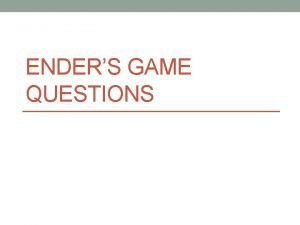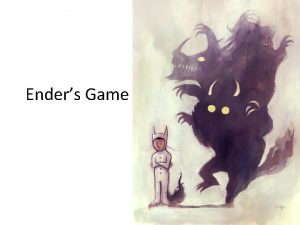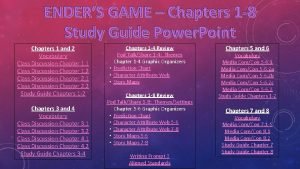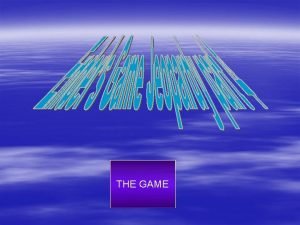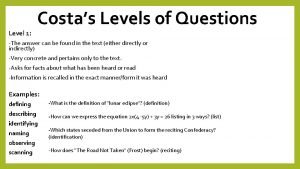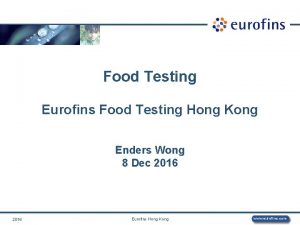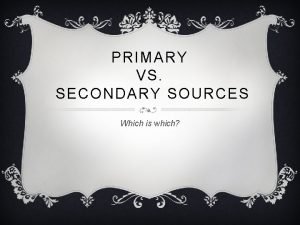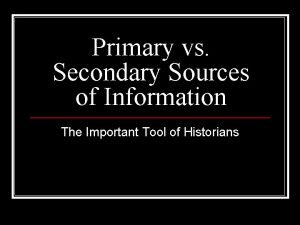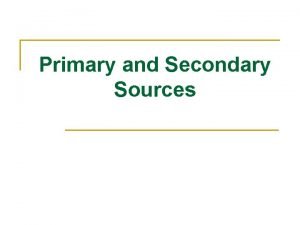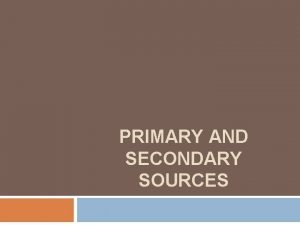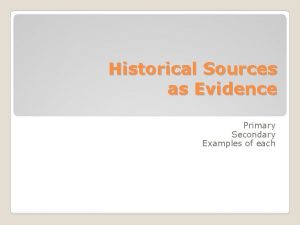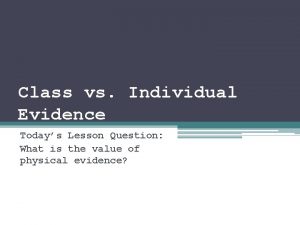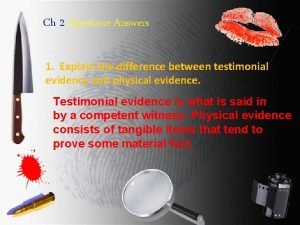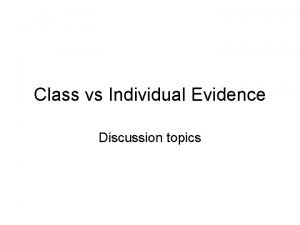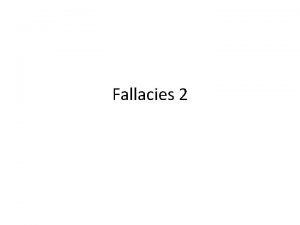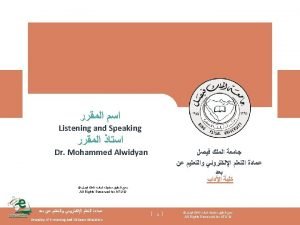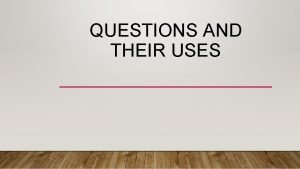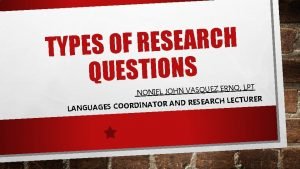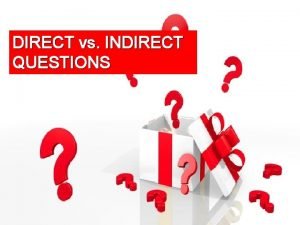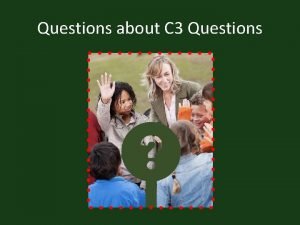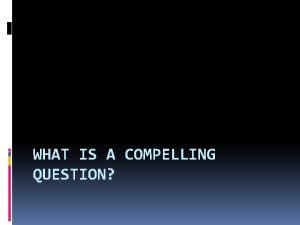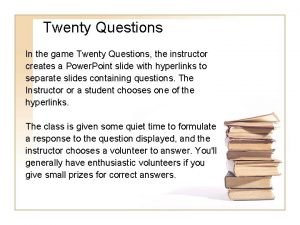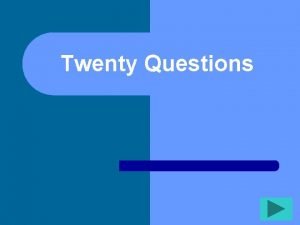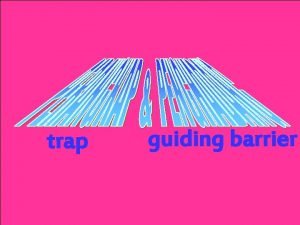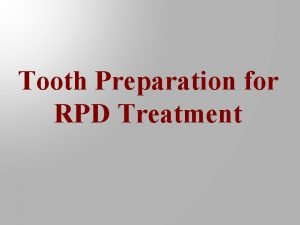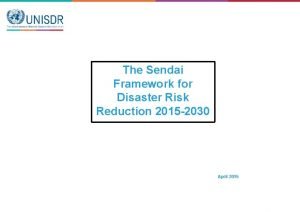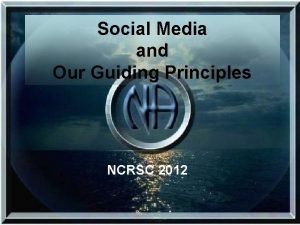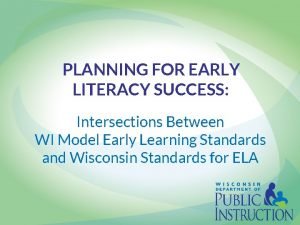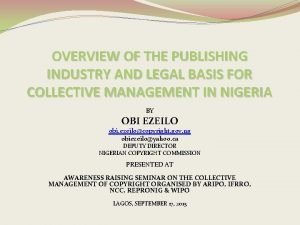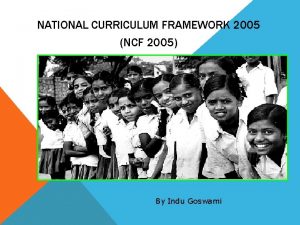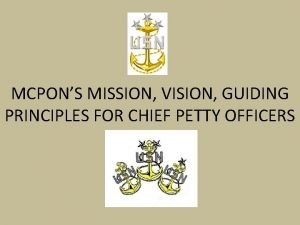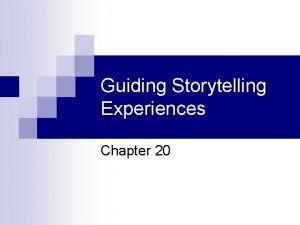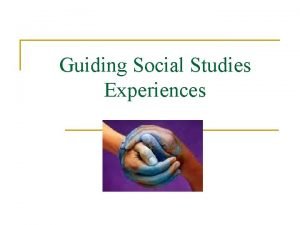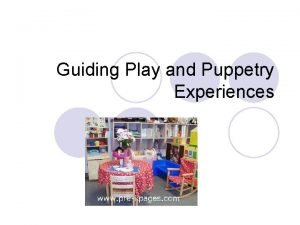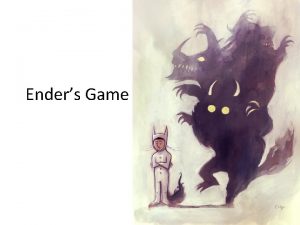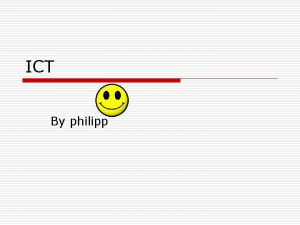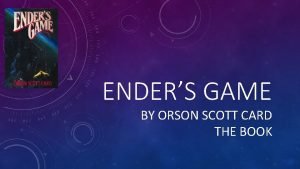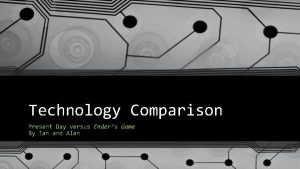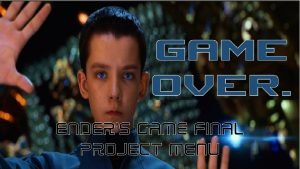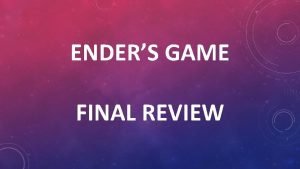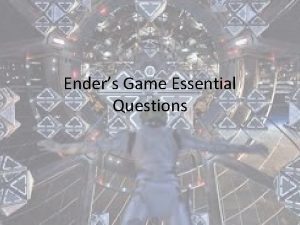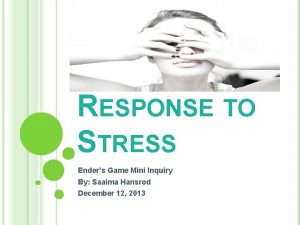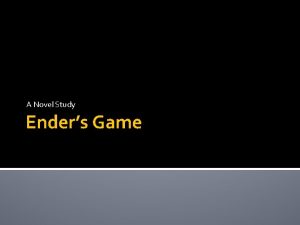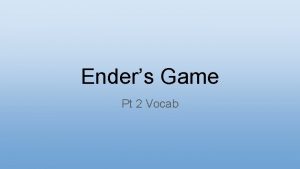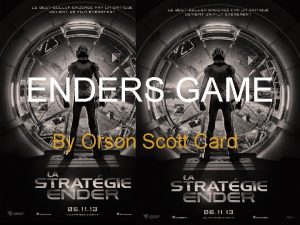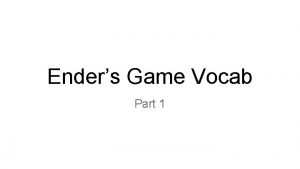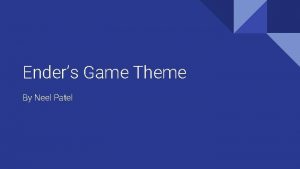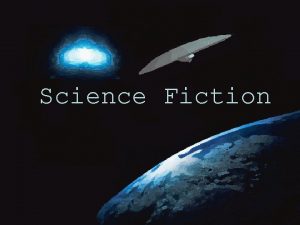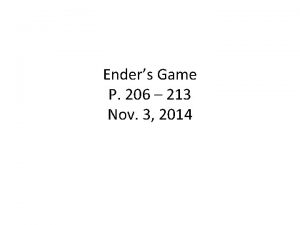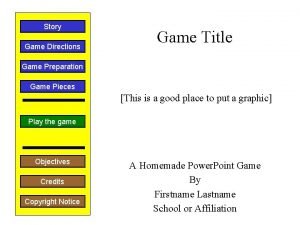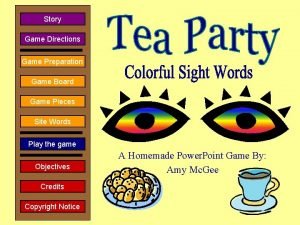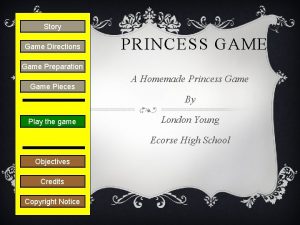Enders Game Guiding Question What is the evidence





































- Slides: 37

Ender’s Game

Guiding Question • What is the evidence that Ender is not just like the monsters he fights? (Psst! Notice his shadow!) This is your culminating Essay prompt.

Learning Target for This Unit When writing or speaking, we will support our ideas w/ evidence from the text. (Sound familiar? It should. It is very much like our prior target of using “ample and vivid details” in our writing, only now the details are in the text of the book we’re reading, not from our lives.

Friday • Vocabulary Quiz – If you finish early, flip your test paper; you can start reading chapter 3. • Ender’s Game Chapter Two -Take out homework questions -Turn and talk with neighbor - Report to class one question discussed

Chapter Two THINKING ABOUT ENDER’S FAMILY • Make a 3 -column chart. In the chart, list adjectives that describe the personalities of each of the three Wiggins kids. PETER ENDER VALENTINE

Chapter Two, Continued ENDER, PETER, VALENTINE • How is Ender like Peter? • How is Ender like Valentine? • How is Ender truly unique? TPS

Weekend Homework • Read Chapter Three (11 pages) • Answer Study Guide Questions. In your answers: - Use complete sentences, not lists. - Be sure you cite evidence from the text. (The Study Guides will be used in small group discussion on Monday, and will be checked for 20 points at the beginning of class. ) -

Ender leaned his head against the wall and cried until the bus came. I am just like Peter. Take my monitor off, and I am just like Peter. (End Ch 1) • Re-read p. 7 - end of Ch 1 (Ender with Stilson), and pp. 11 end of Ch 2 (Ender with Peter). • Is Ender right? Is he just like Peter? – Brainstorm a list of ways in which Ender’s Stilson episode IS like Peter. – Brainstorm a list of ways in which Ender’s Stilson episode is NOT like Peter. TPS

Tuesday Overview - Small Group Discussions (Ch 3 Questions) - 3 -Column Chart Update (add Ch 3 info) - Venn Diagram Groups (incl. Ch 3 info) Objective: Citing Evidence in Writing

Venn Diagram • In your small groups, create a Venn Diagram showing the similarities and differences of the three siblings. – Make sure you draw the circles in pencil! Use this model

Wednesday • Vocab Story Share • Homework Discussion Questions – Literal – Interpretive – Critical • Chapter Four Questions (Collect) • Journal • Reading Time (Ch. 5 due Friday)

Writing What we Know Twice in the novel, Ender has worried that he is “just like Peter”—once at end of Ch 1 when he beats Stilson (8), and again in Ch 4 after he breaks his tormentor’s arm(33). • In a well-developed paragraph, answer the following question. Is Ender right? Is he just like Peter? Use evidence, incl. page #s, to support your ideas.

Thursday HW Check: (3 Discussion Questions + 1 Quote) Vocabulary Oral Review Chapter Four Questions Return Whole Group Discussions / Point System – Why we teach discussion • Civil discourse (norms) • Supporting with evidence – Have your book and HW in hand • Reading Time HW: Ch 5 Study Qs + Key Quote + 1 Discussion Q • •

Discussion Point System • For Asking Questions (Easiest Points!) -Literal Qs: “What…” (1 pt) -Interpretive Qs: “Why does Ender…” (2 pt) -Critical Qs: “Why does the author…” (3 pt) (Ask early! Think of unique questions!) • For Attempting to Answer Questions (1 pt) • For citing the text (2 pt) • For side-chat, repeating something said (-1 pt)

Socratic Seminar Norms • • One at a time Speak to the group, not teacher Refer to the text Try to have intense, knowledgeable conversations. Why have seminars? Our differing understandings help us see the book differently.

Friday • Vocab Quiz – Chapter Five Questions Collect – Return Week 5 Quizes, Ch 4, etc. • Vocab Quiz Score • HW: Chapter Six Questions + 3 Discussion Questions + 1 Cool/Confusing/Interesting Quote » For Monday Socratic Seminar Circles • Reading Time

Monday HW: Start Reading Chapter Seven for Wed --Due Tues: Questions 1 -3 for Chapter 7 --Due Wed: Questions 3 – end for Ch 7 Also for Wednesday… --Create 3 discussion questions --Prepare one quote of text from Ch 7 that you think is cool, interesting, funny, or confusing.

Tuesday Work Day 1) Get your books and Study Questions out. Ms. Davaz will be checking off homework questions 1 -3. 2) For the rest of the period, prepare for Wednesday’s Socratic Seminar by… --Finishing Reading Chapter 7 --Finishing Study Questions 4 -9 for Ch 7 --Preparing 3 Discussion Questions for Wednesday’s Socratic Seminar --Preparing 1 interesting Quote from Ch 7.

Tuesday • Healthy Youth Survey! • Small Group: What do we know about the Buggers and Bugger History?

Buggers • Whip Around: What do we know of the Buggers and Bugger-Human History?

Journal • What makes us human? • What makes us different than animals?

WHAT MAKES US HUMAN? • • • …we love… …we feel bad for hurting another…regret… …we have a conscience… …we have an idea of right and wrong… …we have a capacity for self-restraint… …we can govern ourselves… …we can think first, then act… …we can control ourselves… …we feel compassion, sense the sorrows of others… …we act selflessly, not to benefit ourselves (charity)… …we sacrifice ourselves for others…

WHAT MAKES US HUMAN? (Notes) • • • …we love… …we feel bad for hurting another…regret… …we have a conscience… …we have an idea of right and wrong… …we have a capacity for self-restraint… …we can govern ourselves… …we can think first, then act… …we can control ourselves… …we feel compassion, sense the sorrows of others… …we act selflessly, not to benefit ourselves (charity)… …we sacrifice ourselves for others… WHICH OF THESE DOES ENDER SHOW?

T-Chart of Ender’s Humanity ------------------------------------- • Copy list of traits on left half of a paper. • On right side, brainstorm SPECIFIC examples of when Ender shows each of these qualities. ------------------------------------ • …we love… • …we feel bad for hurting another…regret… • …we have a conscience… an idea of right & wrong… • …we have a capacity for self-restraint, self-control… • …we can think first, then act… • …we feel compassion, sense the sorrows of others… • …we act selflessly, not to benefit ourselves (charity)… • …we sacrifice ourselves for others…

Chapter 9: up to 133. 3 • Answer Study Questions 1 -5

Journal What makes a monster? How is the Monster different from humans and ordinary animals? Think of the Buggers, Voldemort, The Joker, Peter. Brainstorm, then write.

WHAT MAKES US DIFFERENT THAN MONSTERS? (Notes) HOW IS ENDER LIKE THE MONSTERS?

…and for the second time that day, Ender cried. Journal • Describe Ender as a child.

TPS – What is Childhood? • “Adolescence is a period of mourning for the loss of childhood. ” • What is childhood? What characterizes childhood, makes it different from adolescence? • Brainstorm a list.

To what extent is Ender “just like” the monsters he fights? Make a T-Chart SIMILARITIES DIFFERENCES Cite Specific Events Consider Bonzo, Bernard, Stilson, and above all Peter.

Small Groups • Share your T-charts of how ender is like and unlike the monsters he fights. Add to yours. • Together, brainstorm new evidence of similarities and differences. • Create a poster of a T-chart to present. -Group with the most thorough poster wins a prize!

Journal • Describe Ender as a leader.

Journal • To what extent does Ender control his own actions? • To what extent is he controlled by others? By whom and how?

Journal • Describe Ender as Speaker for the Dead.

End Journal • Compare Ender as he is at the beginning of the book, with his character at the end.


Reading Strategies • …make connections between the text and our own experiences. • …make predictions based on clues in text.
 Enders game questions
Enders game questions Ender's game essential questions
Ender's game essential questions Ender's game fairyland map
Ender's game fairyland map Enders game chapter 11 summary
Enders game chapter 11 summary Enders game vocab
Enders game vocab Costa's level 1 questions
Costa's level 1 questions Eurofins food testing hong kong limited
Eurofins food testing hong kong limited What is primary sources
What is primary sources Primary evidence vs secondary evidence
Primary evidence vs secondary evidence Secondary sources
Secondary sources Primary evidence vs secondary evidence
Primary evidence vs secondary evidence Primary evidence vs secondary evidence
Primary evidence vs secondary evidence Is fiber class evidence
Is fiber class evidence Class evidence vs individual evidence
Class evidence vs individual evidence Explain how class evidence may be useful.
Explain how class evidence may be useful. Individual vs class evidence
Individual vs class evidence Define ecological fallacy
Define ecological fallacy Question word simple present
Question word simple present Highly closed question
Highly closed question Contoh open ended question
Contoh open ended question Examples of factor relating questions
Examples of factor relating questions Direct and indirect questions with answers
Direct and indirect questions with answers Compelling question example
Compelling question example Compelling question example
Compelling question example 20 questions game
20 questions game Fun games to play in the car
Fun games to play in the car Guiding barrier
Guiding barrier Canine ledge rest
Canine ledge rest Sendai framework guiding principles
Sendai framework guiding principles Ncrsc
Ncrsc Wisconsin model early learning standards
Wisconsin model early learning standards Laws guiding book publishing in nigeria
Laws guiding book publishing in nigeria National curriculum framework 2005
National curriculum framework 2005 Guiding principles in teaching and learning mtb-mle
Guiding principles in teaching and learning mtb-mle Mcpons guiding principles
Mcpons guiding principles Guiding storytelling experiences
Guiding storytelling experiences Guiding social studies experiences
Guiding social studies experiences Guiding play
Guiding play
